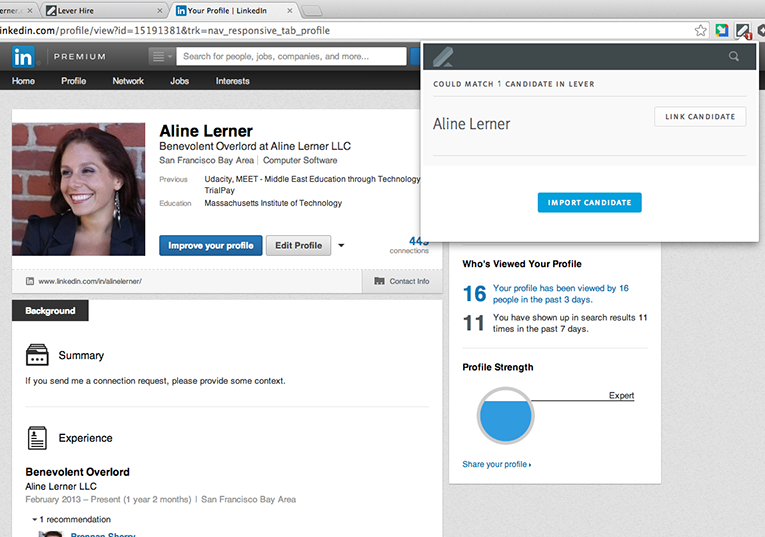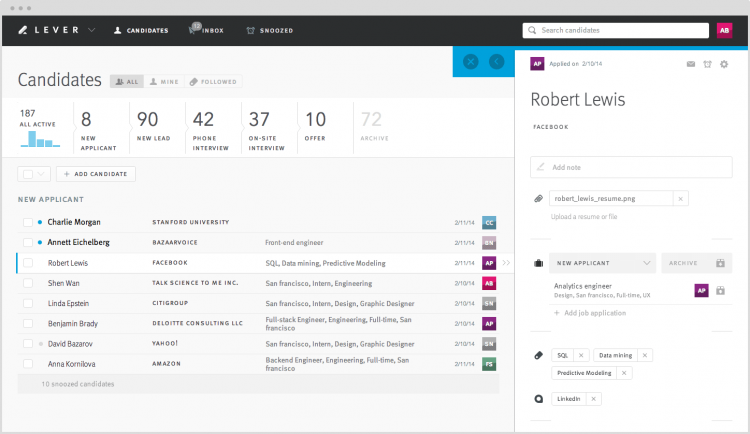Note: This post was adapted from a review I wrote on Quora.
This is a review of Lever, my favorite applicant tracking system (ATS).
ATSs suck
There are a lot of bad ATSs out there. I’ve tried out most of them at this point, and I’m consistently shocked at how they manage to stay in business. Their ability to survive is a testament to how terrible the recruiting software space is. Hiring software is really hard to build correctly because as soon as you get some traction, your big-name enterprise customers start demanding one-off customizations in exchange for fat wads of cash, and that’s hard to say no to. But as soon as you go down the perilous rabbit hole of building custom features, you lose out on usability for the rest of your customer base. As a result, building software can easily devolve into a game of checking as many feature boxes as possible. This is especially true in enterprise sales because the person who ultimately makes the purchasing decisions isn’t necessarily the same person who actually uses the product in question. An extreme example of this is Taleo, which purports to do everything from sourcing and managing the interview pipeline to onboarding candidates and reviewing employees. On paper, it checks all the boxes. It’s the perfect system. But in reality, the product pretty much fails at everything. So then instead of getting a system that does everything, you end up with a hefty subscription fee for a system that actually does nothing useful at all. By the time you realize this, they have all your data. Migration is a nightmare, so you just grin and bear it because they have you by the balls.
It’s absurd how companies that are otherwise really good at things continue to give money to bloated, clunky, borderline unusable products like Taleo and Jobvite.
Lever is awesome
Lever isn’t like that. You know how sometimes you use a product and just feel really good because you can tell it was made by people who get it? It’s so rare, and it’s even rarer in B2B/enterprise software space. With Lever, it’s immediately clear that UX was a priority from day one and that the people who built it took the time to understand the recruiting space rather than just frankensteining together features that sound good on paper. Everything about the Lever experience is deliberate. The product is moving toward a vision of recruiting that I really love — there’s no process for the sake of process, just a system that unobtrusively gives you access to all the info you need and lets you intuitively collaborate with anyone on your team who’s involved in hiring.
Below is some stuff about Lever I really like.
Amazing LinkedIn (and other site) integration
This feature is ridiculously useful. If you’re looking at someone’s LinkedIn profile, Lever’s browser extension can scrape the page and automatically create a corresponding entry in Lever. On top of that, if I’m looking at someone’s LinkedIn profile, and a candidate with the same name already exists in Lever, Lever alerts me and asks if they’re the same person.

This feature is fantastic for collaboration around sourcing, especially if a few people are sourcing within your organization. In the status quo, candidate information is probably going to be in some mix of different people’s emails, LinkedIn, StackOverflow, your current ATS, social media, and so on. This dispersal of information makes it difficult to effectively track who’s been reached out to. The low-friction candidate import features in Lever make it possible for all this info to live in one place, ultimately making it much easier to track response rates and prevent noob mistakes like contacting the same person multiple times without context.
In addition to LinkedIn, you can use the extension with pretty much any site (e.g. GitHub), though not all sites will have a preconfigured scraper.
Snapshot of state
When you log in, you can see exactly who’s in what part of the pipeline.

When you drill down into an individual candidate, you can see everything that’s happened until now inline, including all candidate communication, as well as internal notes and interview feedback. Moreover, any activity that goes with a candidate is always associated with an actor and a timestamp so that you can begin to ask and answer questions about your actual internal process and how it’s going. You’d think this is a given, but I haven’t seen any other product nail this aspect.
It’s not gross to use for non-recruiters
If you want someone else on your team to do something related to a candidate, you just @ them, and the conversation ends up in email. This is particularly awesome because it’s intuitive for people on your team who aren’t recruiters. In general, the feel of the product is about fitting in with Google Apps rather than making you do things in a bunch of places.
The Lever experience also tries to mirror how people would actually operate during hiring if the hiring process weren’t muddled with, well, process. The notion of filling out forms to submit feedback is absent, and though you can customize your process in any way that you want, the idea that you have to rank candidates on some scale or fill in ten different form fields about candidates’ aptitude isn’t something that’s taken for granted. The product doesn’t make any assumptions. All it does is remove the friction associated with storing information and having a bunch of different people interact with it, whether they’re used to doing hiring-related stuff or not.
Ability to snooze candidates and delay rejection emails
Lever has a few Boomerang-like features I really like. Let’s say you reach out to someone over email, and they respond to tell you that they’re stuck at their current gig for the next 6 months. There are a number of home-grown ways to deal with this in the status quo, but none of them are centralized. Lever actually lets you “snooze” candidates for some amount of time and resurface them when it’s time to make contact again. You even get a calendar invite reminder.
Another great feature is rejection email delay. I hate looking at a candidate, deciding he’s not a fit, and then having to remember to reject him later because it’s kind of terrible to reject someone 5 minutes after they apply. To avoid this, Lever lets you schedule rejections for some time in the future.
Things I don’t like
Lever isn’t without shortcomings. The product is extremely young. Bugs crop up from time to time. And there are lots of features that are missing. Here are some shortcomings I noticed.
Absence of tracking on outbound emails and job postings
It would be cool if you could track when candidates open emails and track click-through rate on job postings.
Inconsistent candidate duplication detection
As I mentioned above, Lever’s LinkedIn browser extension is very good at catching candidates you’re looking at in LinkedIn who might also exist in Lever. Unfortunately, if you enter candidates in manually, and you already have someone in the system with the same name, there isn’t any warning asking you if this is intentional.
Somewhat clunky setup process
When you initially set up Lever, you have to talk with someone on the team to get it configured for your company’s pipeline/interview process. Though this isn’t unpleasant, ideally there’d be a way to self-serve any configuration stuff through an admin site.
Stop giving money to shitty products
At the end of the day, I’d caution users to not get into the trap of comparing a product to its platonic ideal over comparing a product to the status quo. In terms of what’s out there at the moment, and given how great Lever is already, I have no idea why everyone wouldn’t use it. Yeah, migration is kind of a bitch (though Lever does its best to make it less painful), and yeah, it’s kind of risky to depend on a very young company that might not be around in a few years, but I see moving away from a terrible ATS to Lever as not only as a rational decision but as a proud rejection of clunky, enterprise systems that make users miserable. Sunk costs, fear, and complacency are not good reasons to make decisions. Awesomeness is.
Your favorite feature is a gross violation of LinkedIn’s terms of service? I wouldn’t get too cozy with it.
Hi Aline,
Thanks for your thoughts on Lever.
What about Automatic Rejection of candidates based on pre-set Rules/segmentation?
i.e..: A given Candidate’s Graduation College is not MIT, then I want to break off right away with him/her.
Would you know or could you refer me the best way to do it based on your vast experience?
Gratitude,
I’m afraid I don’t know about products that do this kind of thing. It seems like a feature that more enterprise-focused ATSs might have, but given the content of this review and the blog in general, you can probably guess what I think about those products and that approach in general.